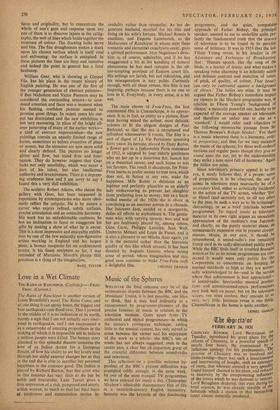Love in a Wet Climate
THE RAINS OF RANCHIPUR. (Carlf011.)—FROU- FROU. (Curzon.)
The Rains of Ranchipur is another version of Louis Bromfield's novel The Rains Came, and of one thing it can surely boast, the biggest and best earthquake-cum-flood ever. That I yawned
in the middle of it is no indication of its worth, merely a sign that I am not actually very inter- ested in earthquakes, and I can recommend it as a catastrophe of amazing proportions in the making of which it is impossible not to believe a million people were killed. The human story attached to this splendid disaster concerns the love of an Indian doctor for a European floozie, of how his ability to see her lovely soul through her sinful exterior changes her so that in the end she is able to sacrifice her personal happiness to the common good. The Indian is played by Richard Burton, that fine actor who in this instance has very little to do but be noble and inscrutable. Lana Turner gives a firm impression of a rich, pampered and utterly selfish woman, so much so that her final burst of tenderness and renunciation invites in-
credulity rather than sympathy. As her de- generate husband, married for his title and living on his wife's fortune, Michael Rennie is excellent, and Eugenie Leontovich, as the Maharanee of Ranchipur in whose state these romantic and elemental cataclysms occur, gives a spirited performance. Jean Negulesco's direc- tion is, of course, admirable, and if he has exaggerated a bit in his handling of natural phenomena he has used restraint in the all- too-tempting province of Eastern court life. His settings are lavish, but not ridiculous, and his miscegenation is very polite. Curiously enough, with all these virtues, this film is not inspiring, perhaps because there is no one to love in it. Everybody, in every sense, is a bit wet.
The main charm of Frou-Frou, the first continental film in CinemaScope, is its appear- ance. It is, in fact, as pretty as a picture, East, man having mixed the softest, most delicate. colours to fit the elegant designs of Paul Bertrand, so that the eye is enraptured and refreshed wheresoever it roams. The film is a sort of digest of La Vie Parisienne spanning forty years.'Its heroine, played by Dany Robin, a flower girl in a fashionable Paris restaurant of 1912, is adopted by four elderly gentlemen who set her up in a luxurious flat, launch her on a theatrical career, and each hopes to win her favours, The result is disastrous, for Frou- Frou learns to prefer money to true love, which does not, in fiction at any rate, make for happiness. Mlle Robin is delicious as an ingenue and perfectly plausible as an elderly lady endeavouring to prevent her daughter from preferring love to money; but as a hard- boiled sweetie of the 1920s she is about as convincing as an amateur actress in a charade. Her innocent face, candid as a marguerite, defies all efforts to sophisticate it. The gentle- men who, with varying success, woo and win her are faultlessly played by, among others, Gino Cervi, Philippe Lemaire, Jean Wall, Umberto Melnati and Louis de Funes, and it is also a pleasure to see Mischa Auer again, yet it is the pictorial rather than the histrionic quality of this film which attracts. It has been directed by Augusto Gemina whose strong sense of period, whose imagination and rare good taste combine• to make Frou-Frou such


































 Previous page
Previous page